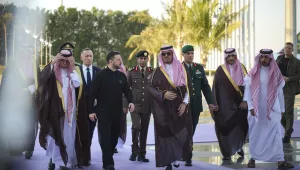A seminar with Amaney Jamal, Edward S. Sanford Professor of Politics and Director, Mamdouha S. Bobst Center for Peace and Justice, Princeton University. Eighth session of the fall 2016 study group led by MEI Visiting Scholar Professor Robert Springborg, Globalization and Its Discontents in the Middle East and North Africa.
RSVP is required for this session. Click here to RSVP. Please note that an RSVP does not guarantee a seat at the session.
Amaney A. Jamal is the Edwards S. Sanford Professor of Politics at Princeton University and director of the Mamdouha S. Bobst Center for Peace and Justice. Jamal also directs the Workshop on Arab Political Development. She currently is President of the Association of Middle East Women’s Studies (AMEWS). The focus of her current research is democratization and the politics of civic engagement in the Arab world. Her interests also include the study of Muslim and Arab Americans and the pathways that structure their patterns of civic engagement in the U.S. Jamal’s books include Barriers to Democracy, which explores the role of civic associations in promoting democratic effects in the Arab world (winner 2008 APSA Best Book Award in comparative democratization); and, as coauthor, Race and Arab Americans Before and After 9/11: From Invisible Citizens to Visible Subjects (2007) and Citizenship and Crisis: Arab Detroit after 9/11 (2009). Her most recent book Of Empires and Citizens was published by Princeton University Press, Fall 2012. In addition to her role as director of Princeton’s Workshop on Arab Political Development, Jamal is a co-director of Princeton’s Luce Project on Migration, Participation, and Democratic Governance in the U.S., Europe, and the Muslim World; principal investigator of the Arab Barometer Project, winner of the Best Dataset in the Field of Comparative Politics( Lijphart/Przeworski/Verba Dataset Award 2010); co-PI of the Detroit Arab American Study, a sister survey to the Detroit Area Study; and senior advisor on the Pew Research Center projects focusing on Islam in America (2006) and Global Islam (2010). Ph.D. University of Michigan. In 2005, Jamal was named a Carnegie Scholar.


